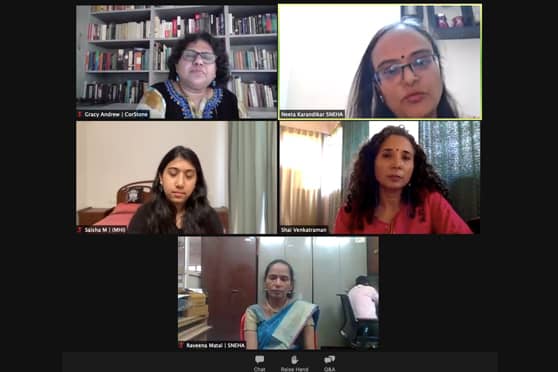The need for addressing mental health issues among the youth during the pandemic was in focus at a webinar organised by CorStone in collaboration with SNEHA.
CorStone develops programmes for well-being of youths, focusing on adolescent girls as critical change agents in their communities, while SNEHA is a non-profit organisation that works with women, children and public health and safety systems.
Addressing the virtual session titled ‘Post-Pandemic Roadmap to Resilience- Strengthening Mental Health Care for the Youth’ on December 15, Gracy Andrew, a clinical psychologist and vice-president of CarStone, said, “The pandemic has emotionally affected everyone, across every milieu and this provides us with the opportunity to create awareness about mental health from a wellbeing perspective. If promoting mental wellbeing can be highlighted instead of solely focusing on counselling-based service provision, we will be able to address mental health in a more sustained manner.”
So far, CorStone has provided resilience training to over 2,00,000 youth and over 5,000 teachers across Bihar, Uttar Pradesh, Uttarakhand, and Rajasthan. In a particularly ambitious endeavour, CorStone has partnered with the Bihar Education Project Council to scale its Youth First resilience training programme to all middle schools and Kasturba Gandhi Balika Vidyalaya (KGBV) across Bihar.
“We believe there is an imperative need – made even more visible because of the pandemic – to provide these important skills to youth through school systems. Collaborations with the government are essential if we are to provide programs that build resilience in a sustainable manner, giving youth, particularly girls, the skills they need to navigate the many challenges they are facing in a positive manner,” said Andrew.
A UNICEF study mentions that young girls have been particularly affected by the pandemic. It reports that 43% of young women feel pessimistic about the future compared to 31% of their male counterparts.
Guest speaker Ravina Matal, a community organiser in SNEHA, said, “With the pandemic, we have seen a sharp rise in feelings of loneliness among the youth, especially young girls. Their social circle has been disintegrated with spaces such as schools and colleges being shut. SNEHA is therefore engaging in home-to-home screening and assessing the need to have a counselling session while understanding environmental determinants affecting youth’s mental health. We are extending promotional support for youth to move beyond the issues faced.”
Neeta Karandikar, associate programme director with SNEHA’s programme on Adolescent Health and Sexuality (EHSAS), said: “Gender-based violence and restrictions on mobility have seen a spike in reference to young girls during the pandemic. Interventions such as smartphone libraries and structured mental health screening introduced by SNEHA have been picked up well by the community. Girls are using smartphones now to engage in group-studies under the COVID-19 protocols laid out by SNEHA.”
SNEHA has come up with video-based resilience modules that are promoted through community youth volunteers via WhatsApp, said Karandikar. There is a need to adopt a more hybrid model where offline and online techniques are combined with building awareness among parents on understanding the emotional needs of their children, she added.
Source: telegraphindia.com








